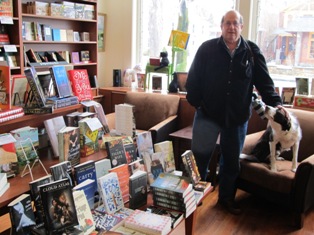"Lesson: not to travel with so many books. I bought more yesterday, unable to resist the bookstores of San Francisco."--The Asian Journal of Thomas Merton
While the latest episode in this story occurred last Saturday at Battenkill Books, Cambridge, N.Y., it began almost 15 years ago, when I was a frontline bookseller answering the phone one day at the Northshire Bookstore, Manchester, Vt.
A man's voice asked if we carried any books by Thomas Merton and that question led, as bookseller conversations sometimes do, into a discussion of Merton's life and work. The caller, author Jon Katz, was researching a project that would eventually become Running to the Mountain: A Journey of Faith and Change (the paperback subtitle is "A Midlife Adventure"). The conversation has continued, off and on, for a long time now.
 |
|
| Jon Katz and Red on duty at Battenkill Books last Saturday. | |
Katz has written many books--Dancing Dogs is his latest--and eloquently chronicles his life in the country at BedlamFarm.com. When I learned he would be working at Battenkill Books for three hours every Saturday as the store's "Recommender-in-Chief," I had to stop by. We talked about old times and new. He handsold me John Banville's Ancient Light and Jonathan Tropper's One Last Thing Before I Go.
I wasn't the only one.
"I was very happy with my first day," Katz told me afterward. He had prepared for his shift by scanning the bookshop's inventory and "had a long list of books I had read and heard about." SInce then, the bookstore has continued to receive e-mails and Facebook messages "asking for recommendations apart from the Saturday hours." He invited Battenkill Books owner Connie Brooks to "just pass them on. Monday she e-mailed me that the orders were flying in, and I made e-mail recommendations for her. This is really worth doing."
Noting that Katz "is hugely supportive of the store, and that has let us be creative about ways we can work together," Brooks cited as an example his 2011 book Going Home: Finding Peace When Pets Die. When it was published, she was able to offer signed and personalized copies to customers: "This proved to be hugely popular, and we still take requests almost every day for signed, personalized copies of Jon's books. We ship them around the country, and even around the world."
Thus, when Katz suggested "serving as a 'book concierge,' or as we call him, 'Recommender-in-Chief,' " Brooks embraced the idea. "He knows how busy I am with the day-to-day running of the store, and this role allows him to share his love of reading. Jon's an avid reader: he's reading about a book per day--and he relishes what all booksellers do--matching up a person with a book he feels they will love. For us, it is a completely new way to involve an author with our store. We've had great feedback on it from customers both near and far."
Recalling his first day on the job, Katz said he "was touched mostly by people's need and eagerness--a starvation almost--to talk to a human about the books they might consider reading. I was aware of three kinds of visitors and callers. E-book readers were not prepared to order on the spot, some people only wanted paperbacks, others just wanted a recommendation for some topical hardcovers. I had to suss out who was who. When I did, it was exciting, chemical really: The Art Forger to a woman whose late husband was an art historian, Little Wolves to a woman born in Minnesota, The Stockholm Octavio to a lover of gentle historical mysteries. It was good that I was prepared, because I needed to be. There are so many people with a passion for books and they seemed so eager to talk with someone who shared the passion."
The Recommender-in-Chief concept "seems to grow and take on its own life," he observed. Noting the challenge booksellers face keeping up with the increasing volume of published titles, he added "it is imperative that this hole be filled while the country is wanting to buy local, as this is something nothing but a good independent bookstore can do and readers--like bookstore people--are struggling with so many choices and an overload of hyper-media."
Brooks agreed: "I hear all the time from folks around the country who have lost their local bookstore, so by proxy, we've become their 'local' store even if they are half way around the country. They gain a personal relationship with a store--real book recommendations and super service, and we gain a broader customer base that helps us to survive."
This is a story that doesn't end, but continues as it began, with conversations and connections, and with the enduring image of Thomas Merton, a mutual literary friend who was also "unable to resist the bookstores."--Robert Gray, contributing editor (column archives available at Fresh Eyes Now)

